Gamecock football legend George Rogers opens up on life, health and that Heisman Trophy
- Oops!Something went wrong.Please try again later.
- Oops!Something went wrong.Please try again later.
Not too many former college football players can point to an actual Heisman Trophy sitting in their TV room and persuade you to pick it up to feel its weight, but former South Carolina running back George Rogers can.
As we anticipate Saturday night’s season-opening border clash between South Carolina and North Carolina in Charlotte’s Bank of America Stadium, one of the greatest Gamecock athletes of all time is the star of this week’s “Sports Legends of the Carolinas.”
Rogers had 27 games in which he rushed for more than 100 yards for USC. In 1980, he won that Heisman Trophy (which turns out to be surprisingly heavy) after an extraordinary senior season.
Following his college career at USC, Rogers became the first overall pick of the 1981 NFL draft by the New Orleans Saints and immediately led the NFL in rushing yards as a rookie. He played for seven seasons in the NFL, for New Orleans and Washington, and was a two-time Pro Bowler who once scored 18 touchdowns in a single season.
In his final NFL season, in 1987, Rogers won a Super Bowl ring with Washington. Soon after that, he retired from football at age 29. Life got more complicated after that, but Rogers has faced its challenges with a quick smile and ever-present laugh.
Now 64 years old, Rogers and his wife, Brenda, live about 20 minutes from Williams-Brice Stadium in Columbia, South Carolina. A 13-foot statue of Rogers stands near the stadium.
This interview has been edited for clarity and brevity. A much fuller version of the conversation can be found on the free “Sports Legends of the Carolinas” podcast, available wherever you get your podcasts.
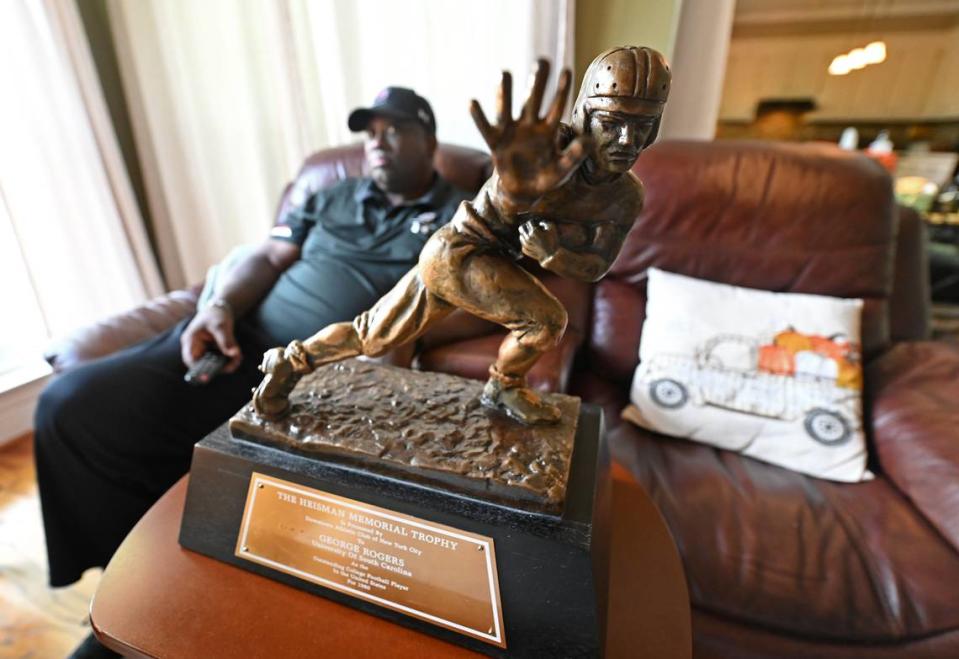
Scott Fowler: You grew up in Duluth, Ga. What was that like?
George Rogers: I grew up very poor. We were on welfare. We were happy to have food anywhere — peanut butter and jelly sandwiches, almost all the time. Hot dogs. Maybe, sometimes, hamburgers. It was hard. But we got through it.
My mom was a hard-working lady. I loved my mom. Every time she left the house, I tried to follow her everywhere. I’d sneak up behind her and she’s like: “Boy, I told you not to follow me.”
SF: When did you start playing football?
GR: The first time I played football, I didn’t know how to play. I just went out there because everybody else was out there. And the quarterback got in the huddle and said he’s gonna pitch the ball right to me. He pitched the ball to me. I’d seen all them guys coming toward me, and I threw it right back to him.
I still got knocked all around and came off the field. I was dizzy. I said: “What’d I do wrong?”
The coach said, “You’re supposed to get the ball and go.” And then we practiced that next week and I said, “OK, I got this.”
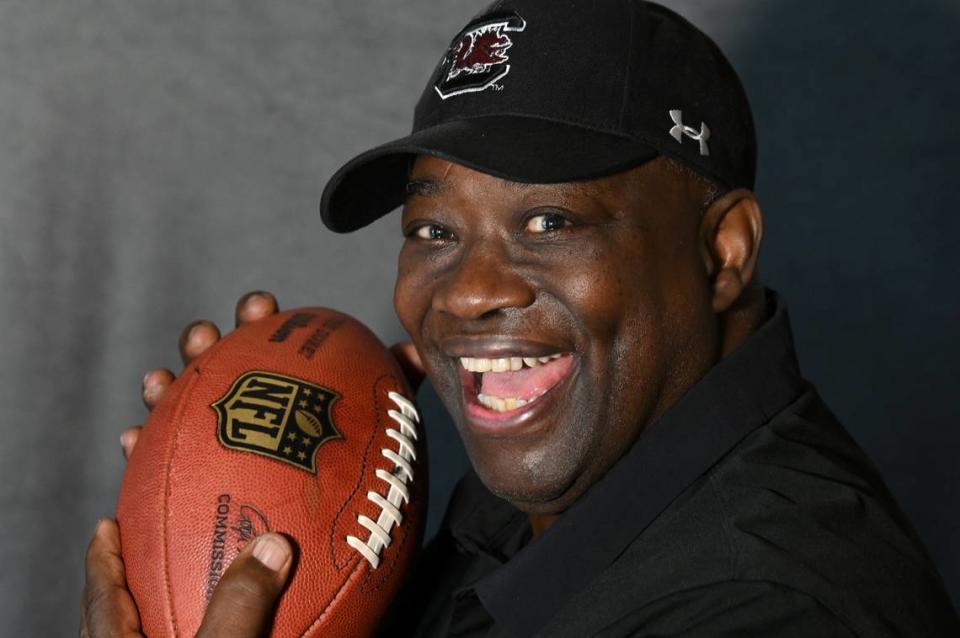
Then we did it in the game. They gave me that ball and boy, I took off running. I went around that end, and I was gone.
I ran until there was no more grass left. And I turned around and started coming back the other way. And all my teammates — they were coming to congratulate me. I started dodging them, too. They said “Boy, you just scored a touchdown! There the end zone is, right there.”
And they pointed to that little box, you know. And I said, “Oh, that’s what you’re supposed to do?!” And that’s how I learned how to play football.
SF: That reminds me of the scene in “Forrest Gump” where he keeps on running through the tunnel.
GR: Yeah, I thought my own teammates were trying to hit me. I was about 10 years old at the time.
SF: You were a standout high school running back in Georgia. Why didn’t you go to the University of Georgia?
GR: Too close to Duluth. It’s maybe 45 minutes. I wasn’t going to be staying at home because I knew if I stayed at home, that’s where I was gonna be going: Home all the time.
SF: Where did your family want you to go?
GR: Tennessee. And I was just like, “Man, that orange — I just can’t see myself in no orange equipment. I just can’t see it.”
SF: That ruled out Clemson, too, I guess.
GR: I did visit Clemson but the atmosphere wasn’t there. And South Carolina had two running backs leaving at the same time. And the position was open. Coach (Jim) Carlen told me he said, “Son, if you come to South Carolina, you can start your freshman year.” Nobody (else) told me that. I said: “OK, I’m coming to South Carolina.”
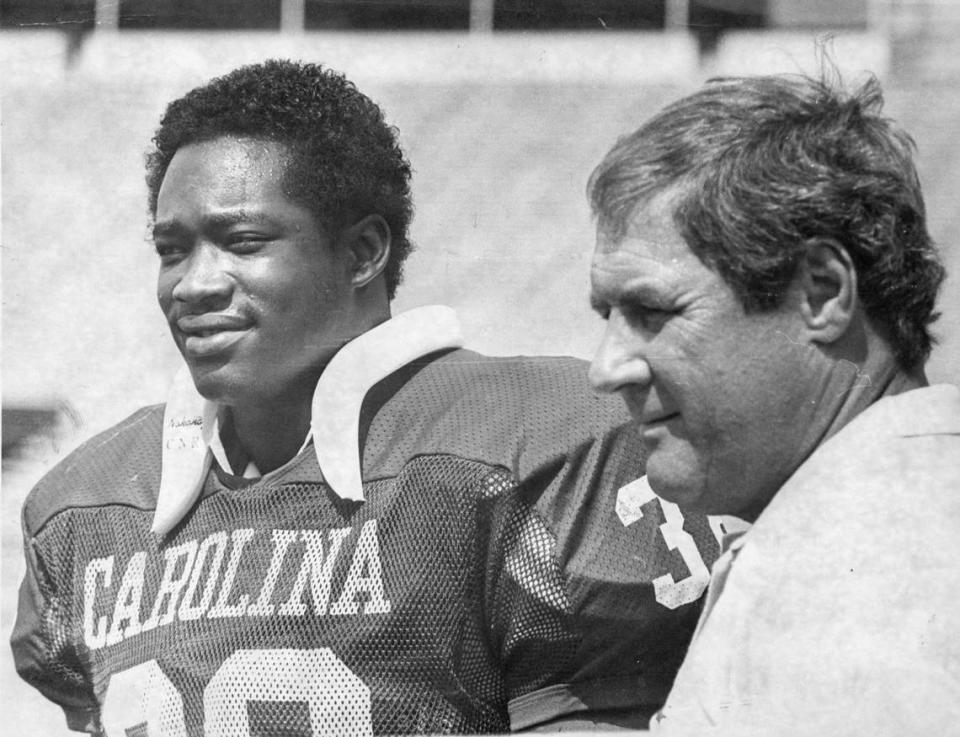
SF: You had a remarkable career for the Gamecocks. When did you realize that you weren’t only a decent college football player but that you could be a star?
GR: I never did think I was a star at anything. I think the people around me made me look good. I’m not the guy to say, “I did this” and “I did that.” My mom kept me grounded. She said, “Hey, you got other people out there helping you, so don’t forget about them. There ain’t no need to be arrogant about it, because you’re gonna have to do it again.”
SF: Did you have a favorite win at South Carolina?
GR: The Michigan game (a 17-14 South Carolina win at Michigan in 1980). There were 103,000 people — are you kidding me? I thought we were just going to go up there and play our best. I didn’t think we were gonna win. But we actually won the game, in the “Big House” (Michigan’s nickname for its stadium. It was like, “Man, we got the Big House now.”
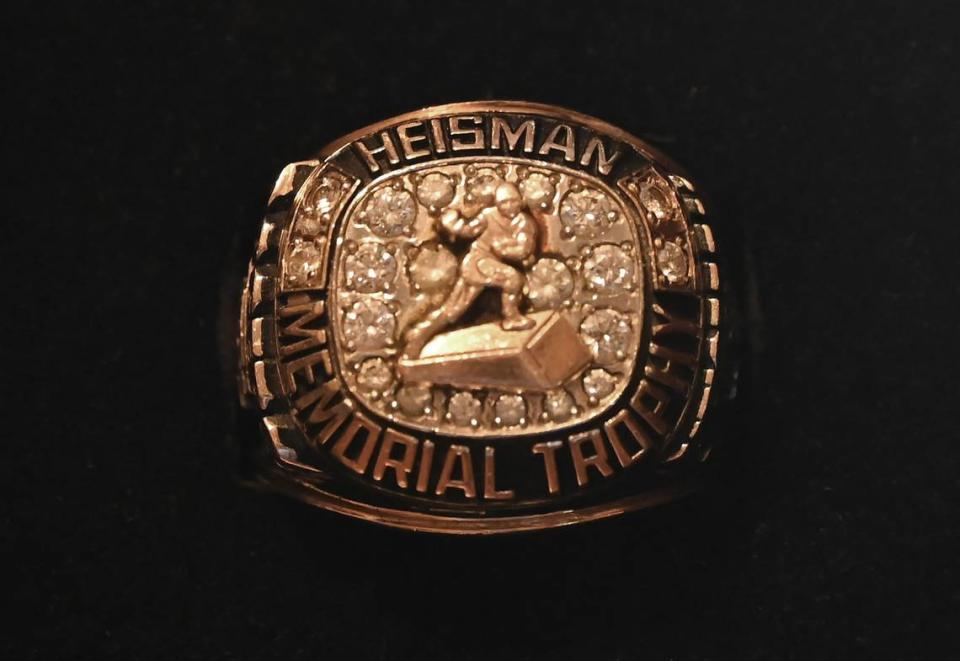
SF: Who are the best running backs you ever saw?
GR: Herschel Walker is the best. He’s the best runner. Bo Jackson was a good running back, too. So him and Bo, right there together. And then I might be a kissing cousin, something like that.
SF: They had speed and power, for sure. That was your game too.
GR: Mmm, not like they had. They had that world-class speed. Now at 40 yards — they might have had a fight (with Rogers) on that one.
SF: You were drafted No. 1 overall by the New Orleans Saints, ahead of Lawrence Taylor, who was No. 2. Then you led the entire league in rushing yardage in 1981, with 1674 yards. What was that year like?
GR: (Laughs). Archie Manning was the quarterback and called all the plays at the line of scrimmage. All of them. And I was like, “Archie, when are you going to throw a pass?” I mean I was run, run, running.
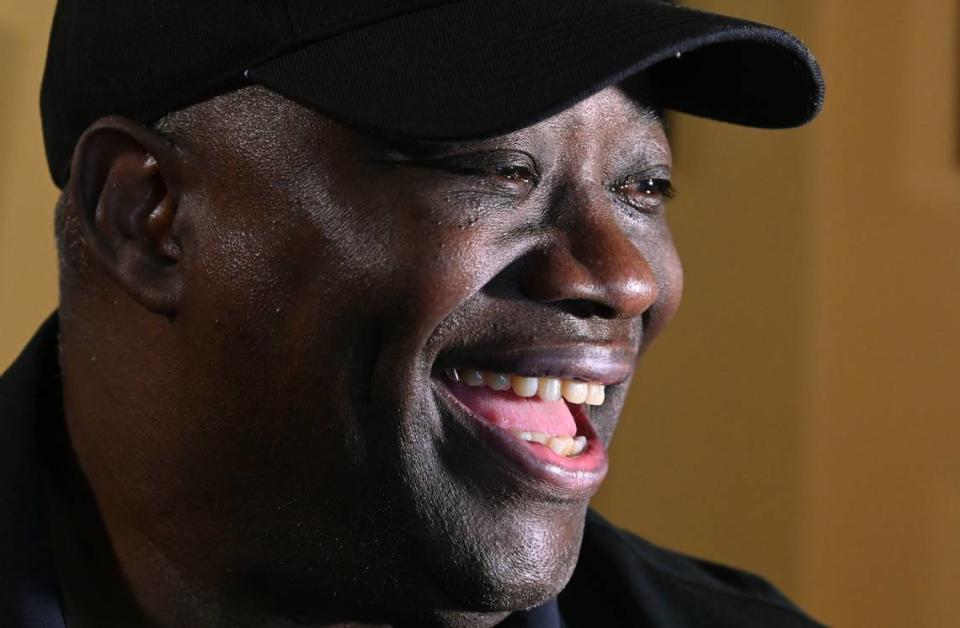
SF: You were only 29 years old when you retired from the NFL.
GR: I know it. But what does it take to retire? I mean, I’d been running the football ever since I was in high school and then in college, and then seven years in the pros. Getting hit by the best people out there.
SF: You’ve been public about this before, but did drug abuse come close to wrecking your life?
GR: Oh, it did. Back in the day, I was just trying to act out. I was feeling bad, feeling sorry for myself. Can’t nobody tell me what to do. I wouldn’t want nobody to be in the situation I was in.
Just thinking about yourself, and that was dead wrong. Because I got kids, and I would love to be around. And I am around now. Because I made the choice between doing drugs or loving God. So I chose God.
SF: It was cocaine in your case that you had to kick?
GR: Well, no, it wasn’t just cocaine. Marijuana. Drinking alcohol…. a number of things. But there comes a time in your life when you say, “I ain’t gonna do nothing that hurts my body again.”
SF: Was there a certain moment in your life that made you say: “Never again”?
GR: Well, I had another child. And that made me think about where I was at. All the rest of my kids were grown. Our youngest boy, he’s a junior at South Carolina. Guess who he’s working with (for an internship)? Nancy Pelosi (the speaker of the House of Representatives). He’s a good kid, man, he really is.
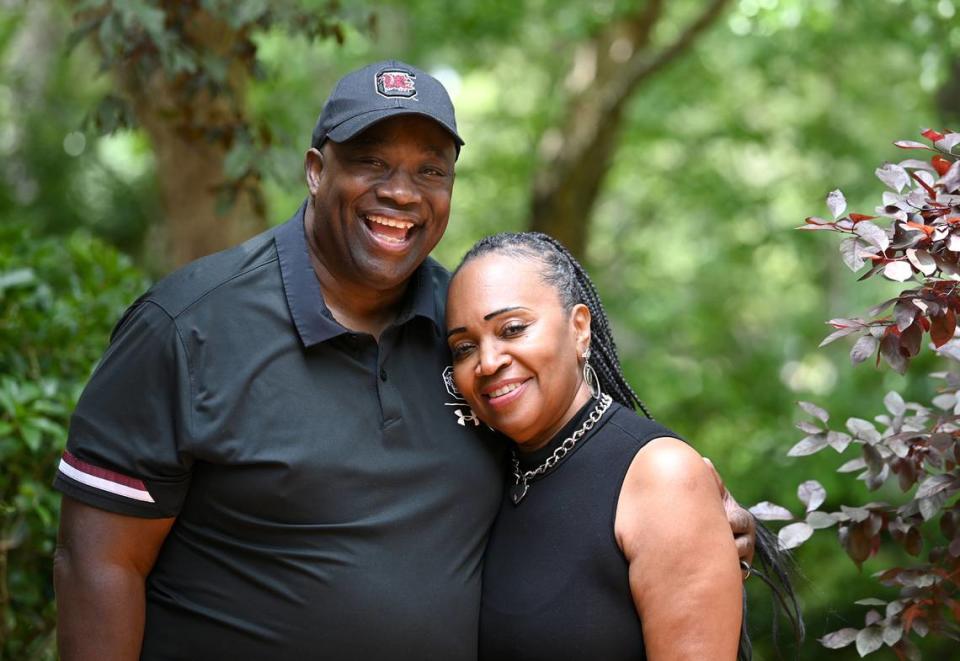
SF: How is your health these days?
GR: Actually, I’m doing good. My blood pressure is good and I’m doing good. I do need to lose some weight. I’m used to eating hot dogs, hamburgers — but Brenda (Rogers’ wife) is trying to make sure I eat vegetables. Squash, you know. Stuff that you don’t like. But she’s trying to keep me healthy. I do go to the gym, though, 2-3 times a week.
SF: Do you have memory issues, as so many former NFL players do?
GR: Oh, I do. Running backs, it’s gonna happen (because of the pounding that running backs take). You might as well just forget that. You’re gonna have them.
Maybe not at an early age, but at an older age you’re gonna have them. I have to ask my wife sometimes: “Where are we going? We’d be in the car. And I’d be driving. ‘Now where did we say we were going?’ She’d be like: ‘What is going on with you?’”
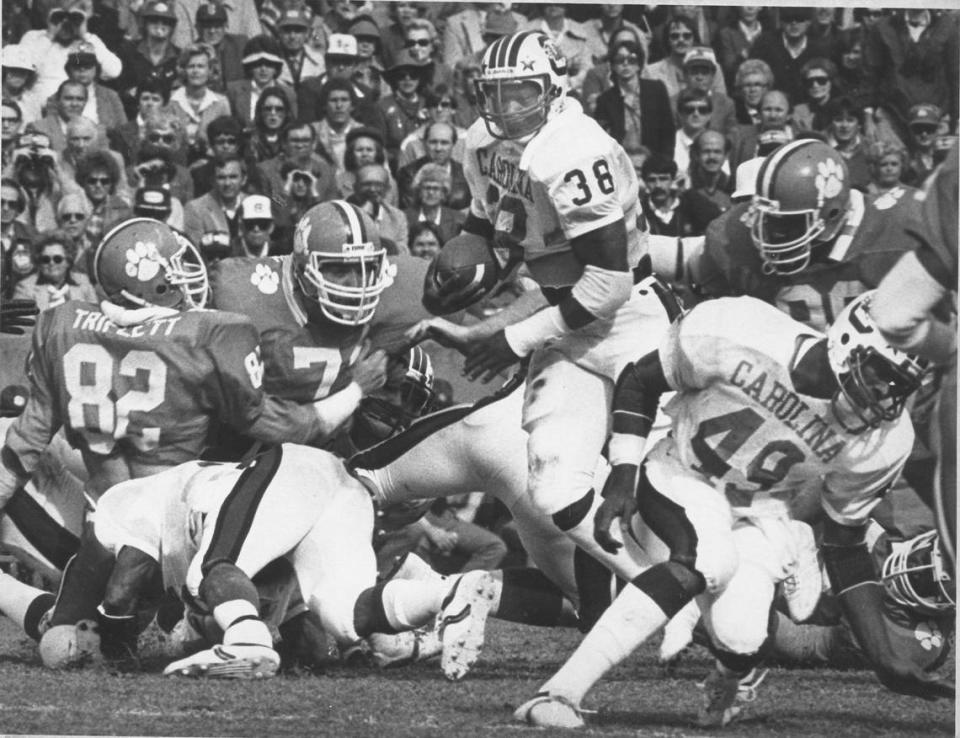
SF: We did one of these “Sports Legends” interviews with Danny Ford, the former Clemson coach. Aren’t the two of you friends despite the Clemson-USC rivalry?
GR: Oh yeah, man, we’re buddies. Him or Dabo (Swinney, Clemson’s current coach) — I would play for either one of them. I like Dabo as well. He’s a great coach, too.
SF: You went back and got your degree at USC, and you’ve had a charitable foundation in your name for a long time. What is its purpose?
GR: I started my foundation maybe 27 years ago. We’ve been giving out scholarships to needy (and first generation) students that want to get an education. Not athletes, just students that go to school and need to get the money to do it. I give out a $10,000 scholarship and a $5,000 scholarship each year.
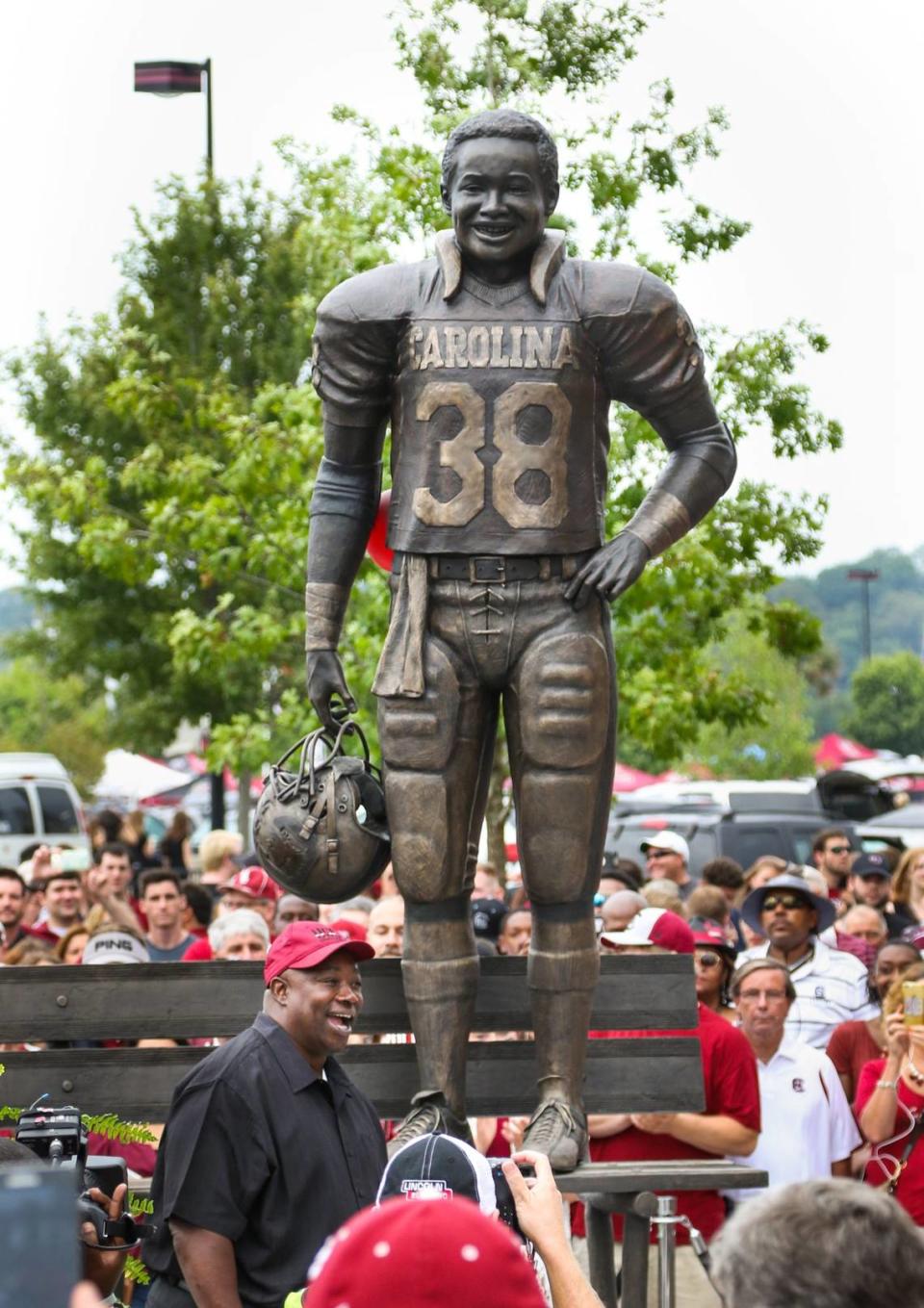
SF: Is it weird to see a statue of yourself in Columbia, or to drive on George Rogers Boulevard, a road that is named for you near Williams-Brice Stadium?
GR: I think it is. (Laughs) This is something you’re supposed to have when you ain’t around.
But then I look at the statue and I see just how much the university poured into that, and into my teammates. And you know what? We delivered.


